Healthcare Management: Ethical Dilemmas, Equipment, and Codes
VerifiedAdded on 2022/12/19
|7
|1854
|58
Report
AI Summary
This report delves into the ethical dilemmas encountered by clinical engineers, such as breaches of patient confidentiality and conflicts of interest related to gifts from equipment suppliers, along with the importance of adhering to professional codes of conduct. The report examines the ethical considerations of purchasing medical equipment, emphasizing the need for clinical and technical specifications, cost-effectiveness, and the importance of avoiding overly complex or unapproved technologies. It discusses the significance of presenting work at conferences, differentiating between scenarios where data is available and where it is not, and provides references to relevant literature on ethical conduct and healthcare technology management. The analysis covers various aspects of healthcare management, from ethical issues to practical considerations in equipment selection and presentation of research findings, offering a comprehensive view of the challenges and best practices in the field.
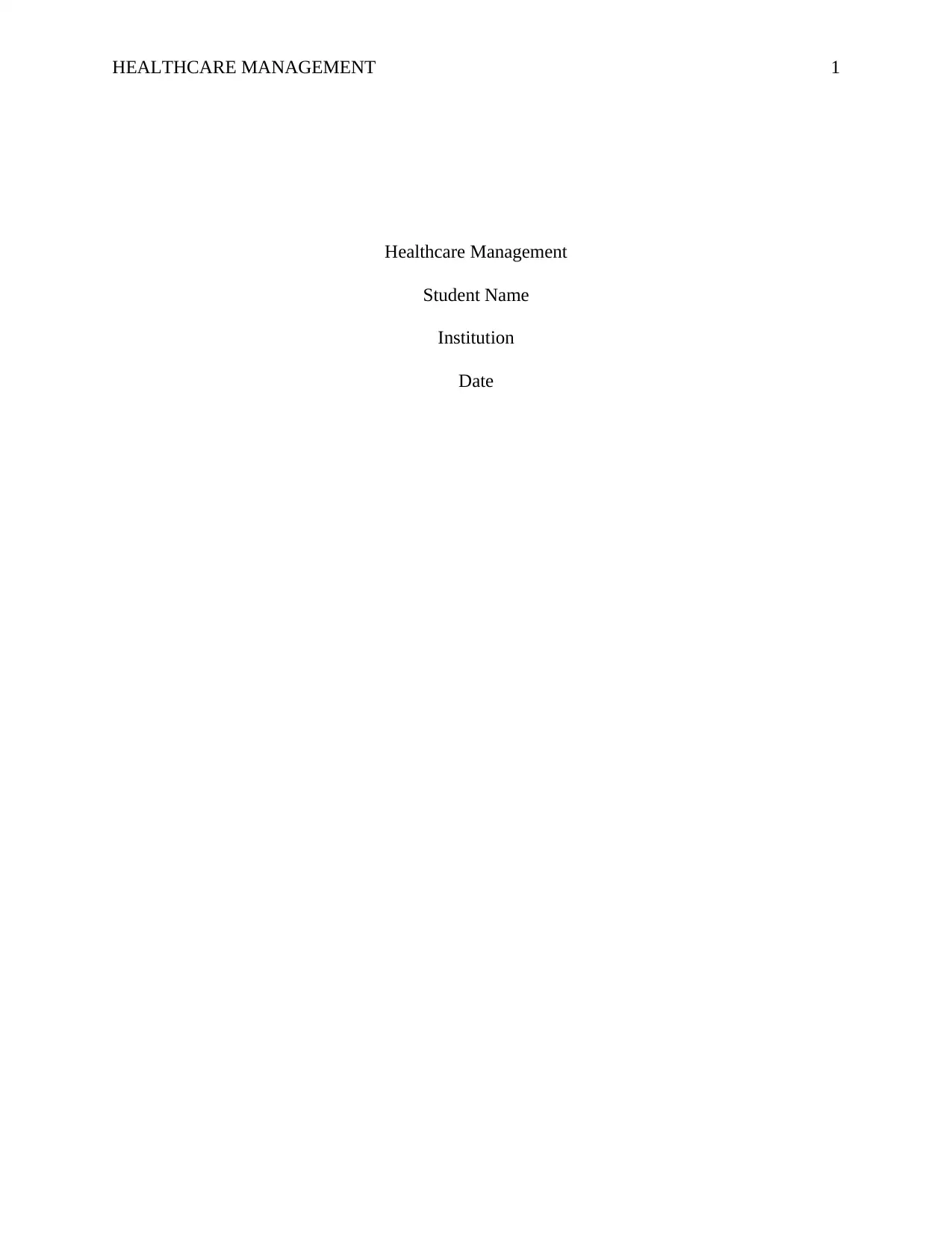
HEALTHCARE MANAGEMENT 1
Healthcare Management
Student Name
Institution
Date
Healthcare Management
Student Name
Institution
Date
Paraphrase This Document
Need a fresh take? Get an instant paraphrase of this document with our AI Paraphraser
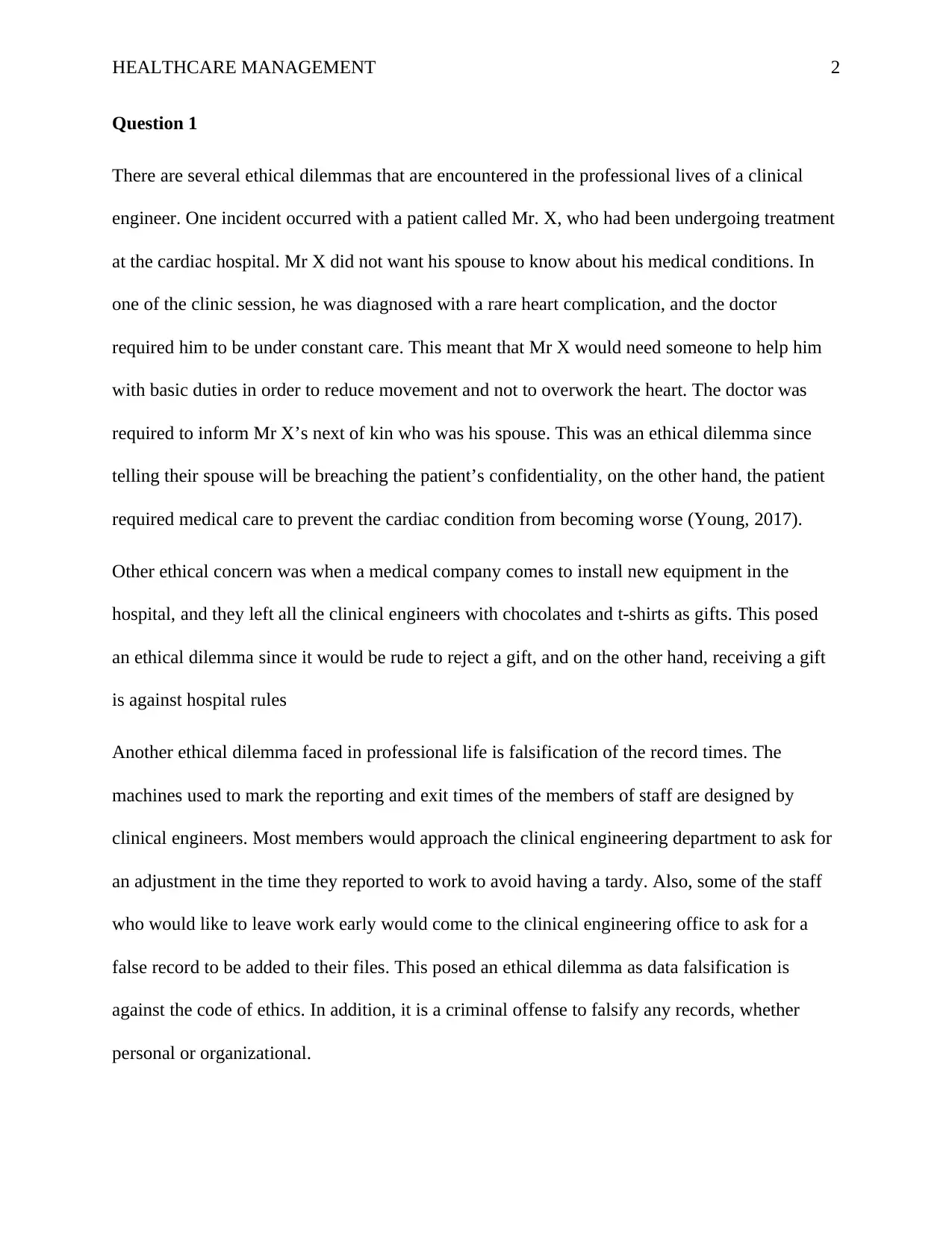
HEALTHCARE MANAGEMENT 2
Question 1
There are several ethical dilemmas that are encountered in the professional lives of a clinical
engineer. One incident occurred with a patient called Mr. X, who had been undergoing treatment
at the cardiac hospital. Mr X did not want his spouse to know about his medical conditions. In
one of the clinic session, he was diagnosed with a rare heart complication, and the doctor
required him to be under constant care. This meant that Mr X would need someone to help him
with basic duties in order to reduce movement and not to overwork the heart. The doctor was
required to inform Mr X’s next of kin who was his spouse. This was an ethical dilemma since
telling their spouse will be breaching the patient’s confidentiality, on the other hand, the patient
required medical care to prevent the cardiac condition from becoming worse (Young, 2017).
Other ethical concern was when a medical company comes to install new equipment in the
hospital, and they left all the clinical engineers with chocolates and t-shirts as gifts. This posed
an ethical dilemma since it would be rude to reject a gift, and on the other hand, receiving a gift
is against hospital rules
Another ethical dilemma faced in professional life is falsification of the record times. The
machines used to mark the reporting and exit times of the members of staff are designed by
clinical engineers. Most members would approach the clinical engineering department to ask for
an adjustment in the time they reported to work to avoid having a tardy. Also, some of the staff
who would like to leave work early would come to the clinical engineering office to ask for a
false record to be added to their files. This posed an ethical dilemma as data falsification is
against the code of ethics. In addition, it is a criminal offense to falsify any records, whether
personal or organizational.
Question 1
There are several ethical dilemmas that are encountered in the professional lives of a clinical
engineer. One incident occurred with a patient called Mr. X, who had been undergoing treatment
at the cardiac hospital. Mr X did not want his spouse to know about his medical conditions. In
one of the clinic session, he was diagnosed with a rare heart complication, and the doctor
required him to be under constant care. This meant that Mr X would need someone to help him
with basic duties in order to reduce movement and not to overwork the heart. The doctor was
required to inform Mr X’s next of kin who was his spouse. This was an ethical dilemma since
telling their spouse will be breaching the patient’s confidentiality, on the other hand, the patient
required medical care to prevent the cardiac condition from becoming worse (Young, 2017).
Other ethical concern was when a medical company comes to install new equipment in the
hospital, and they left all the clinical engineers with chocolates and t-shirts as gifts. This posed
an ethical dilemma since it would be rude to reject a gift, and on the other hand, receiving a gift
is against hospital rules
Another ethical dilemma faced in professional life is falsification of the record times. The
machines used to mark the reporting and exit times of the members of staff are designed by
clinical engineers. Most members would approach the clinical engineering department to ask for
an adjustment in the time they reported to work to avoid having a tardy. Also, some of the staff
who would like to leave work early would come to the clinical engineering office to ask for a
false record to be added to their files. This posed an ethical dilemma as data falsification is
against the code of ethics. In addition, it is a criminal offense to falsify any records, whether
personal or organizational.
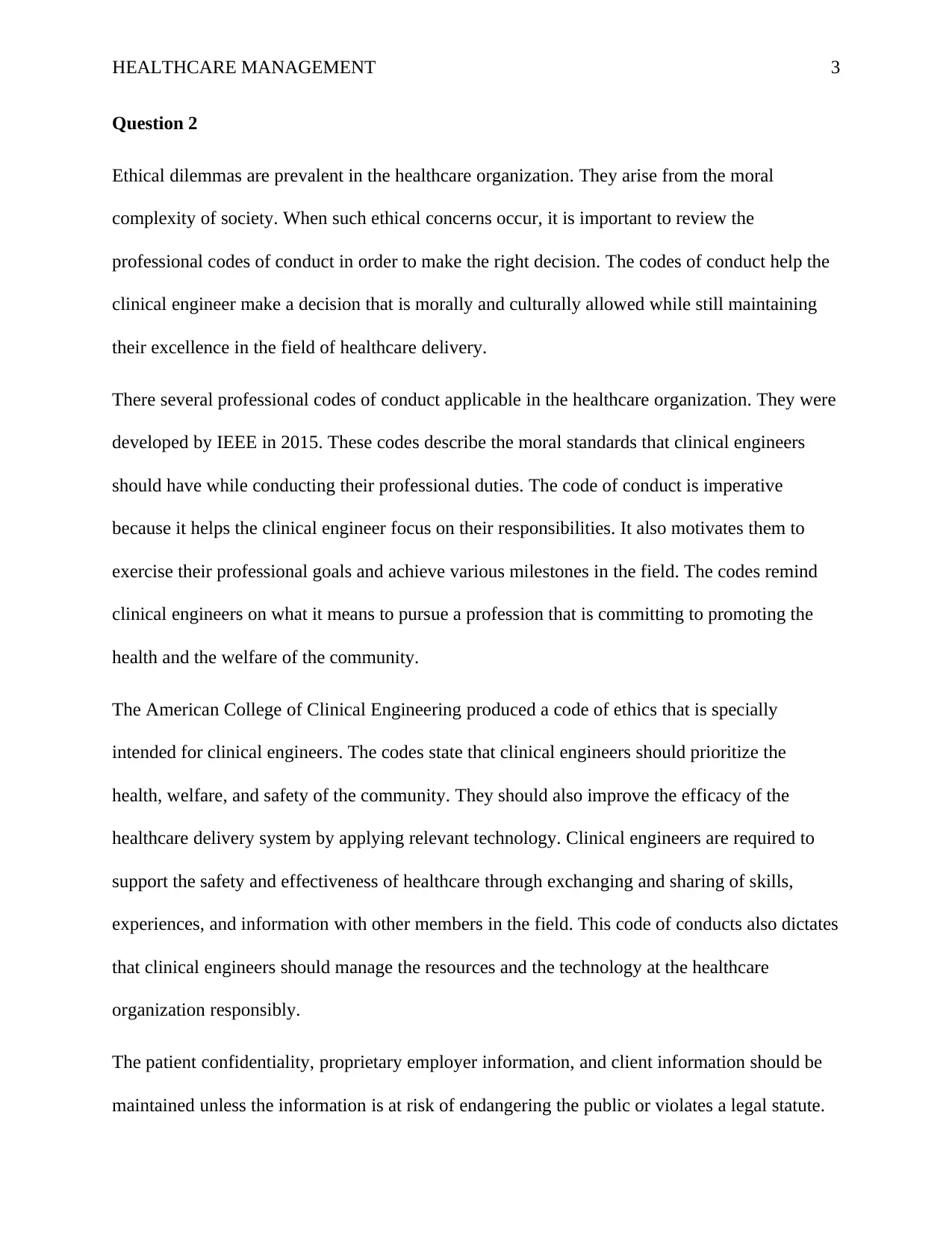
HEALTHCARE MANAGEMENT 3
Question 2
Ethical dilemmas are prevalent in the healthcare organization. They arise from the moral
complexity of society. When such ethical concerns occur, it is important to review the
professional codes of conduct in order to make the right decision. The codes of conduct help the
clinical engineer make a decision that is morally and culturally allowed while still maintaining
their excellence in the field of healthcare delivery.
There several professional codes of conduct applicable in the healthcare organization. They were
developed by IEEE in 2015. These codes describe the moral standards that clinical engineers
should have while conducting their professional duties. The code of conduct is imperative
because it helps the clinical engineer focus on their responsibilities. It also motivates them to
exercise their professional goals and achieve various milestones in the field. The codes remind
clinical engineers on what it means to pursue a profession that is committing to promoting the
health and the welfare of the community.
The American College of Clinical Engineering produced a code of ethics that is specially
intended for clinical engineers. The codes state that clinical engineers should prioritize the
health, welfare, and safety of the community. They should also improve the efficacy of the
healthcare delivery system by applying relevant technology. Clinical engineers are required to
support the safety and effectiveness of healthcare through exchanging and sharing of skills,
experiences, and information with other members in the field. This code of conducts also dictates
that clinical engineers should manage the resources and the technology at the healthcare
organization responsibly.
The patient confidentiality, proprietary employer information, and client information should be
maintained unless the information is at risk of endangering the public or violates a legal statute.
Question 2
Ethical dilemmas are prevalent in the healthcare organization. They arise from the moral
complexity of society. When such ethical concerns occur, it is important to review the
professional codes of conduct in order to make the right decision. The codes of conduct help the
clinical engineer make a decision that is morally and culturally allowed while still maintaining
their excellence in the field of healthcare delivery.
There several professional codes of conduct applicable in the healthcare organization. They were
developed by IEEE in 2015. These codes describe the moral standards that clinical engineers
should have while conducting their professional duties. The code of conduct is imperative
because it helps the clinical engineer focus on their responsibilities. It also motivates them to
exercise their professional goals and achieve various milestones in the field. The codes remind
clinical engineers on what it means to pursue a profession that is committing to promoting the
health and the welfare of the community.
The American College of Clinical Engineering produced a code of ethics that is specially
intended for clinical engineers. The codes state that clinical engineers should prioritize the
health, welfare, and safety of the community. They should also improve the efficacy of the
healthcare delivery system by applying relevant technology. Clinical engineers are required to
support the safety and effectiveness of healthcare through exchanging and sharing of skills,
experiences, and information with other members in the field. This code of conducts also dictates
that clinical engineers should manage the resources and the technology at the healthcare
organization responsibly.
The patient confidentiality, proprietary employer information, and client information should be
maintained unless the information is at risk of endangering the public or violates a legal statute.
⊘ This is a preview!⊘
Do you want full access?
Subscribe today to unlock all pages.

Trusted by 1+ million students worldwide
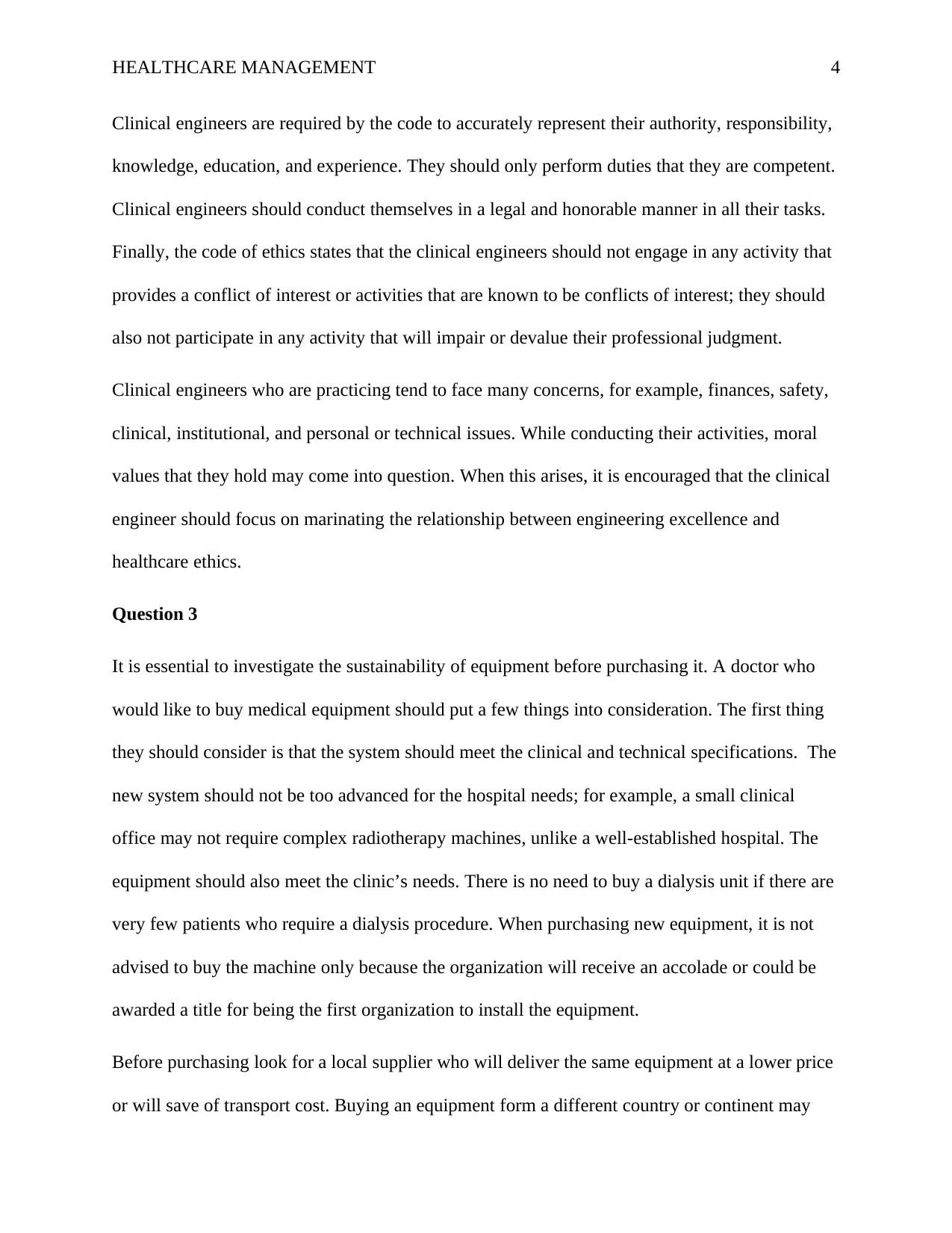
HEALTHCARE MANAGEMENT 4
Clinical engineers are required by the code to accurately represent their authority, responsibility,
knowledge, education, and experience. They should only perform duties that they are competent.
Clinical engineers should conduct themselves in a legal and honorable manner in all their tasks.
Finally, the code of ethics states that the clinical engineers should not engage in any activity that
provides a conflict of interest or activities that are known to be conflicts of interest; they should
also not participate in any activity that will impair or devalue their professional judgment.
Clinical engineers who are practicing tend to face many concerns, for example, finances, safety,
clinical, institutional, and personal or technical issues. While conducting their activities, moral
values that they hold may come into question. When this arises, it is encouraged that the clinical
engineer should focus on marinating the relationship between engineering excellence and
healthcare ethics.
Question 3
It is essential to investigate the sustainability of equipment before purchasing it. A doctor who
would like to buy medical equipment should put a few things into consideration. The first thing
they should consider is that the system should meet the clinical and technical specifications. The
new system should not be too advanced for the hospital needs; for example, a small clinical
office may not require complex radiotherapy machines, unlike a well-established hospital. The
equipment should also meet the clinic’s needs. There is no need to buy a dialysis unit if there are
very few patients who require a dialysis procedure. When purchasing new equipment, it is not
advised to buy the machine only because the organization will receive an accolade or could be
awarded a title for being the first organization to install the equipment.
Before purchasing look for a local supplier who will deliver the same equipment at a lower price
or will save of transport cost. Buying an equipment form a different country or continent may
Clinical engineers are required by the code to accurately represent their authority, responsibility,
knowledge, education, and experience. They should only perform duties that they are competent.
Clinical engineers should conduct themselves in a legal and honorable manner in all their tasks.
Finally, the code of ethics states that the clinical engineers should not engage in any activity that
provides a conflict of interest or activities that are known to be conflicts of interest; they should
also not participate in any activity that will impair or devalue their professional judgment.
Clinical engineers who are practicing tend to face many concerns, for example, finances, safety,
clinical, institutional, and personal or technical issues. While conducting their activities, moral
values that they hold may come into question. When this arises, it is encouraged that the clinical
engineer should focus on marinating the relationship between engineering excellence and
healthcare ethics.
Question 3
It is essential to investigate the sustainability of equipment before purchasing it. A doctor who
would like to buy medical equipment should put a few things into consideration. The first thing
they should consider is that the system should meet the clinical and technical specifications. The
new system should not be too advanced for the hospital needs; for example, a small clinical
office may not require complex radiotherapy machines, unlike a well-established hospital. The
equipment should also meet the clinic’s needs. There is no need to buy a dialysis unit if there are
very few patients who require a dialysis procedure. When purchasing new equipment, it is not
advised to buy the machine only because the organization will receive an accolade or could be
awarded a title for being the first organization to install the equipment.
Before purchasing look for a local supplier who will deliver the same equipment at a lower price
or will save of transport cost. Buying an equipment form a different country or continent may
Paraphrase This Document
Need a fresh take? Get an instant paraphrase of this document with our AI Paraphraser
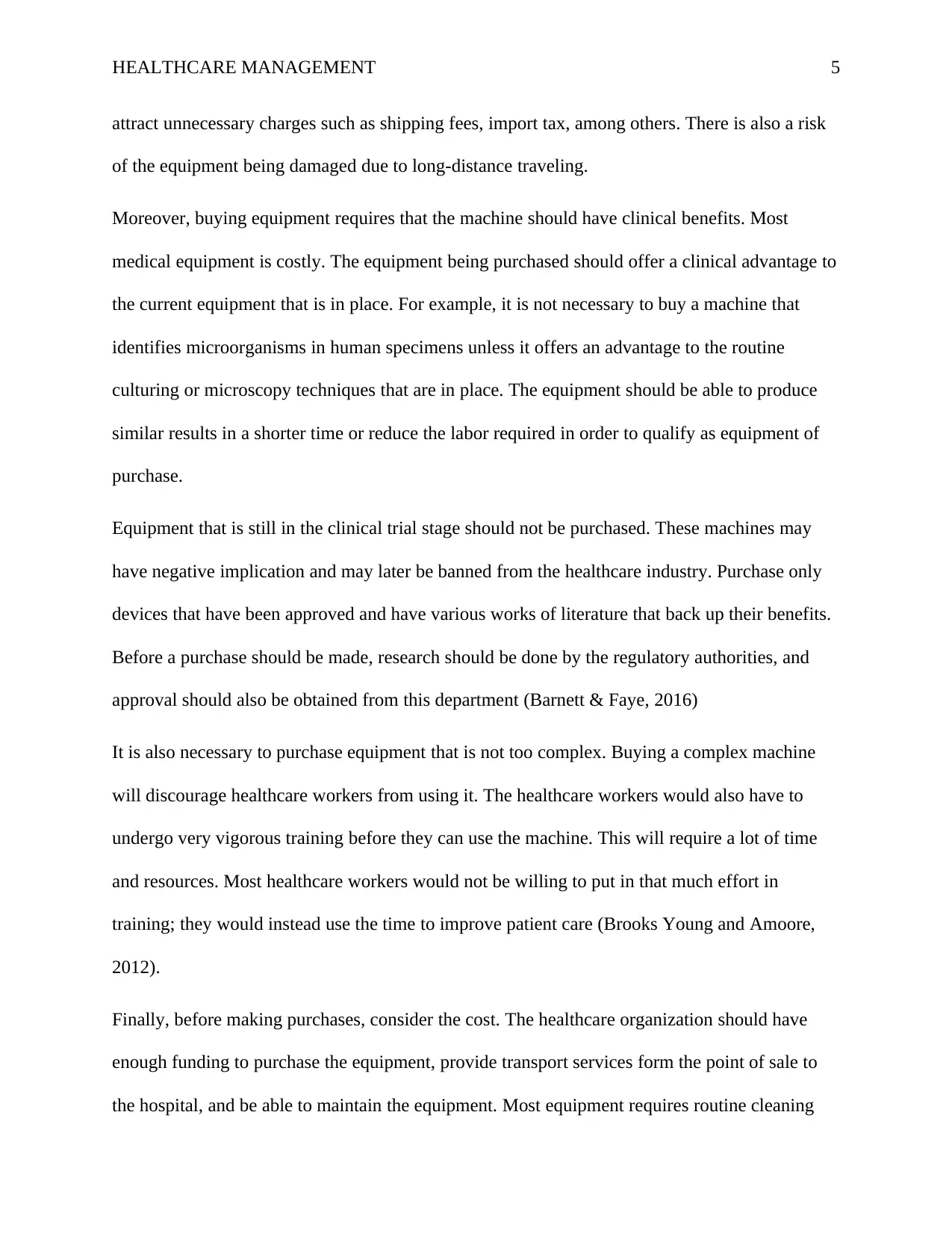
HEALTHCARE MANAGEMENT 5
attract unnecessary charges such as shipping fees, import tax, among others. There is also a risk
of the equipment being damaged due to long-distance traveling.
Moreover, buying equipment requires that the machine should have clinical benefits. Most
medical equipment is costly. The equipment being purchased should offer a clinical advantage to
the current equipment that is in place. For example, it is not necessary to buy a machine that
identifies microorganisms in human specimens unless it offers an advantage to the routine
culturing or microscopy techniques that are in place. The equipment should be able to produce
similar results in a shorter time or reduce the labor required in order to qualify as equipment of
purchase.
Equipment that is still in the clinical trial stage should not be purchased. These machines may
have negative implication and may later be banned from the healthcare industry. Purchase only
devices that have been approved and have various works of literature that back up their benefits.
Before a purchase should be made, research should be done by the regulatory authorities, and
approval should also be obtained from this department (Barnett & Faye, 2016)
It is also necessary to purchase equipment that is not too complex. Buying a complex machine
will discourage healthcare workers from using it. The healthcare workers would also have to
undergo very vigorous training before they can use the machine. This will require a lot of time
and resources. Most healthcare workers would not be willing to put in that much effort in
training; they would instead use the time to improve patient care (Brooks Young and Amoore,
2012).
Finally, before making purchases, consider the cost. The healthcare organization should have
enough funding to purchase the equipment, provide transport services form the point of sale to
the hospital, and be able to maintain the equipment. Most equipment requires routine cleaning
attract unnecessary charges such as shipping fees, import tax, among others. There is also a risk
of the equipment being damaged due to long-distance traveling.
Moreover, buying equipment requires that the machine should have clinical benefits. Most
medical equipment is costly. The equipment being purchased should offer a clinical advantage to
the current equipment that is in place. For example, it is not necessary to buy a machine that
identifies microorganisms in human specimens unless it offers an advantage to the routine
culturing or microscopy techniques that are in place. The equipment should be able to produce
similar results in a shorter time or reduce the labor required in order to qualify as equipment of
purchase.
Equipment that is still in the clinical trial stage should not be purchased. These machines may
have negative implication and may later be banned from the healthcare industry. Purchase only
devices that have been approved and have various works of literature that back up their benefits.
Before a purchase should be made, research should be done by the regulatory authorities, and
approval should also be obtained from this department (Barnett & Faye, 2016)
It is also necessary to purchase equipment that is not too complex. Buying a complex machine
will discourage healthcare workers from using it. The healthcare workers would also have to
undergo very vigorous training before they can use the machine. This will require a lot of time
and resources. Most healthcare workers would not be willing to put in that much effort in
training; they would instead use the time to improve patient care (Brooks Young and Amoore,
2012).
Finally, before making purchases, consider the cost. The healthcare organization should have
enough funding to purchase the equipment, provide transport services form the point of sale to
the hospital, and be able to maintain the equipment. Most equipment requires routine cleaning
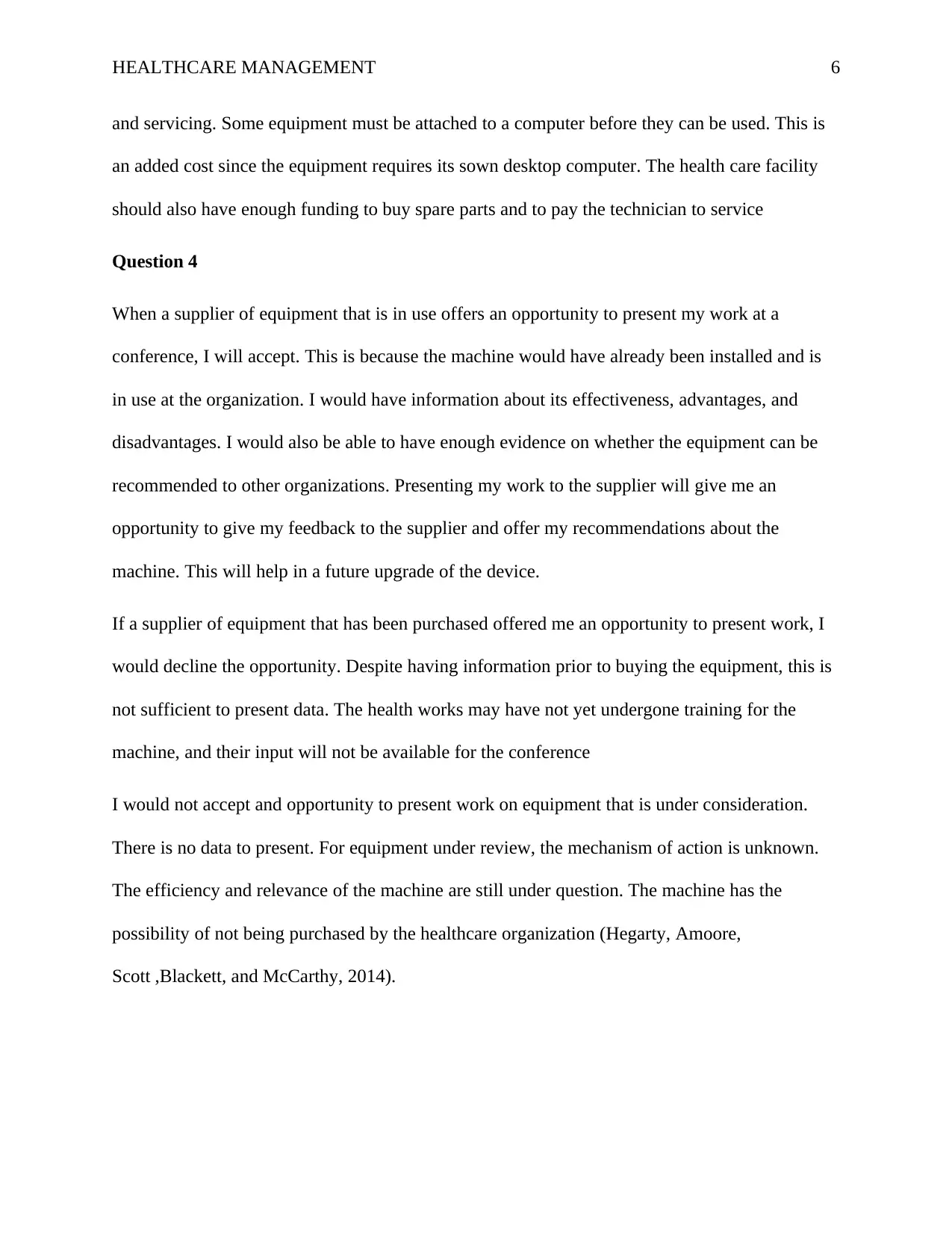
HEALTHCARE MANAGEMENT 6
and servicing. Some equipment must be attached to a computer before they can be used. This is
an added cost since the equipment requires its sown desktop computer. The health care facility
should also have enough funding to buy spare parts and to pay the technician to service
Question 4
When a supplier of equipment that is in use offers an opportunity to present my work at a
conference, I will accept. This is because the machine would have already been installed and is
in use at the organization. I would have information about its effectiveness, advantages, and
disadvantages. I would also be able to have enough evidence on whether the equipment can be
recommended to other organizations. Presenting my work to the supplier will give me an
opportunity to give my feedback to the supplier and offer my recommendations about the
machine. This will help in a future upgrade of the device.
If a supplier of equipment that has been purchased offered me an opportunity to present work, I
would decline the opportunity. Despite having information prior to buying the equipment, this is
not sufficient to present data. The health works may have not yet undergone training for the
machine, and their input will not be available for the conference
I would not accept and opportunity to present work on equipment that is under consideration.
There is no data to present. For equipment under review, the mechanism of action is unknown.
The efficiency and relevance of the machine are still under question. The machine has the
possibility of not being purchased by the healthcare organization (Hegarty, Amoore,
Scott ,Blackett, and McCarthy, 2014).
and servicing. Some equipment must be attached to a computer before they can be used. This is
an added cost since the equipment requires its sown desktop computer. The health care facility
should also have enough funding to buy spare parts and to pay the technician to service
Question 4
When a supplier of equipment that is in use offers an opportunity to present my work at a
conference, I will accept. This is because the machine would have already been installed and is
in use at the organization. I would have information about its effectiveness, advantages, and
disadvantages. I would also be able to have enough evidence on whether the equipment can be
recommended to other organizations. Presenting my work to the supplier will give me an
opportunity to give my feedback to the supplier and offer my recommendations about the
machine. This will help in a future upgrade of the device.
If a supplier of equipment that has been purchased offered me an opportunity to present work, I
would decline the opportunity. Despite having information prior to buying the equipment, this is
not sufficient to present data. The health works may have not yet undergone training for the
machine, and their input will not be available for the conference
I would not accept and opportunity to present work on equipment that is under consideration.
There is no data to present. For equipment under review, the mechanism of action is unknown.
The efficiency and relevance of the machine are still under question. The machine has the
possibility of not being purchased by the healthcare organization (Hegarty, Amoore,
Scott ,Blackett, and McCarthy, 2014).
⊘ This is a preview!⊘
Do you want full access?
Subscribe today to unlock all pages.

Trusted by 1+ million students worldwide
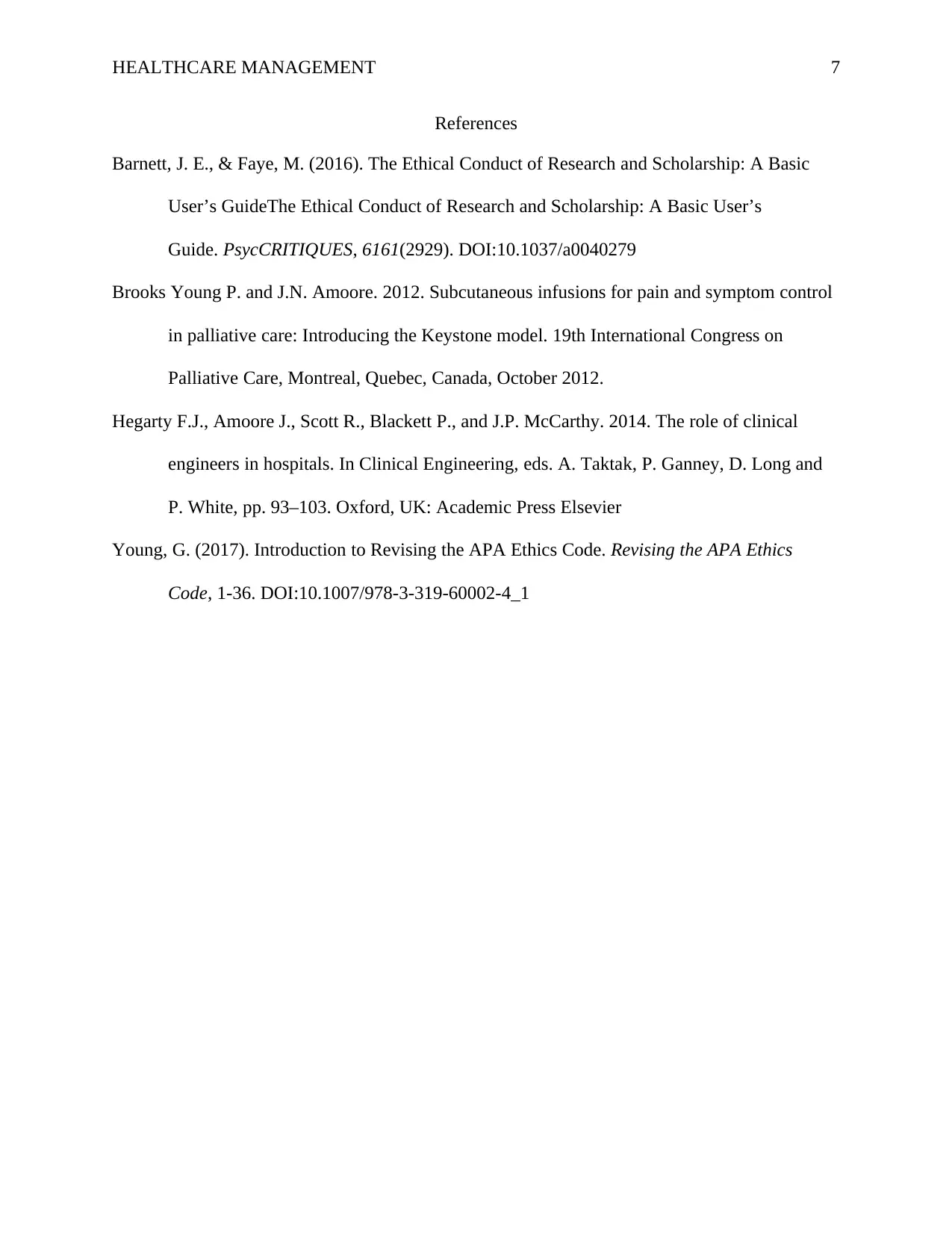
HEALTHCARE MANAGEMENT 7
References
Barnett, J. E., & Faye, M. (2016). The Ethical Conduct of Research and Scholarship: A Basic
User’s GuideThe Ethical Conduct of Research and Scholarship: A Basic User’s
Guide. PsycCRITIQUES, 6161(2929). DOI:10.1037/a0040279
Brooks Young P. and J.N. Amoore. 2012. Subcutaneous infusions for pain and symptom control
in palliative care: Introducing the Keystone model. 19th International Congress on
Palliative Care, Montreal, Quebec, Canada, October 2012.
Hegarty F.J., Amoore J., Scott R., Blackett P., and J.P. McCarthy. 2014. The role of clinical
engineers in hospitals. In Clinical Engineering, eds. A. Taktak, P. Ganney, D. Long and
P. White, pp. 93–103. Oxford, UK: Academic Press Elsevier
Young, G. (2017). Introduction to Revising the APA Ethics Code. Revising the APA Ethics
Code, 1-36. DOI:10.1007/978-3-319-60002-4_1
References
Barnett, J. E., & Faye, M. (2016). The Ethical Conduct of Research and Scholarship: A Basic
User’s GuideThe Ethical Conduct of Research and Scholarship: A Basic User’s
Guide. PsycCRITIQUES, 6161(2929). DOI:10.1037/a0040279
Brooks Young P. and J.N. Amoore. 2012. Subcutaneous infusions for pain and symptom control
in palliative care: Introducing the Keystone model. 19th International Congress on
Palliative Care, Montreal, Quebec, Canada, October 2012.
Hegarty F.J., Amoore J., Scott R., Blackett P., and J.P. McCarthy. 2014. The role of clinical
engineers in hospitals. In Clinical Engineering, eds. A. Taktak, P. Ganney, D. Long and
P. White, pp. 93–103. Oxford, UK: Academic Press Elsevier
Young, G. (2017). Introduction to Revising the APA Ethics Code. Revising the APA Ethics
Code, 1-36. DOI:10.1007/978-3-319-60002-4_1
1 out of 7
Related Documents
Your All-in-One AI-Powered Toolkit for Academic Success.
+13062052269
info@desklib.com
Available 24*7 on WhatsApp / Email
![[object Object]](/_next/static/media/star-bottom.7253800d.svg)
Unlock your academic potential
Copyright © 2020–2026 A2Z Services. All Rights Reserved. Developed and managed by ZUCOL.





